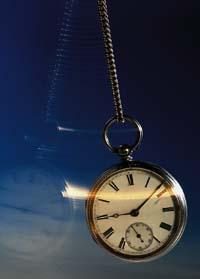Time delay measurement

According to Einstein's special theory of relativity, at the speed of light time is dilated, that is, it is passed more slowly. In 1907 Einstein made this forecast and now some physicists from the University of Manitoba have tested this theory through an experiment proposed by Einstein himself.
The experiment is based on the frequency of light waves. Atoms and ions are able to absorb energy and emit light of a certain wavelength. The emitting light moves with a wavy motion and has a frequency depending on the wavelength of the light, that is, it needs a certain time to perform each complete wave movement.
Based on this, Einstein said that if an ion is accelerated to the speed of light, the time for the ion would be reduced and, consequently, the movement of the waves would slow down. That is, he considers that this ion would emit a lower frequency light.
To demonstrate Einstein's experiment, the Manitoba team accelerated lithium ions up to 6% of the speed of light with a particle accelerator. The ions were then excited by laser beams and the frequency of light emitted was measured. The results indicated that, with an accuracy of 1/10,000,000, the frequency of light emitted by the ions had slowed, as indicated by the particular theory of relativity.





